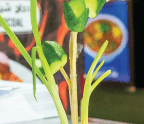I Met Fear on the Hill
LESLIE JAMISON
It’s the summer of 1966, and Sheila and Peter are a young married couple living in Berkeley. They are very much in love, and also very high—tripping on acid for the first time in their lives, in Tilden Park—walking in a shallow stream full of primordial monsters, or at least salamanders. The leaves are emeralds. The whole world is an amoeba. They are Adam and Eve, and they’ve found their way back to the garden.
They are renting a room in a communal house from a lawyer turned drug dealer; a local character named Wild Bill painted on their walls during an acid trip, “Oh Lord, I could be bounded in a nutshell and count myself a king of infinite space, were it not that I have BAD DREAMS.” They eat spaghetti made with pot pesto and cookies baked with pot butter. Drugs make their minds feel wrapped in rabbit fur. They go to dinner parties that turn into orgies. They have a wife swap with a distinguished poet and his wife. They believe in liberating love from possession, but their open marriage starts buckling when Sheila falls in love with someone else.
This is the plot, more or less, of “The Parting of the Ways,” an unpublished novel written by a man named Peter Bergel in 1968. It’s the story of two people who are young and passionate and broke and vulnerable, and it’s the story—ultimately—of their shared future dissolving. It’s also the story of my mother.
MY MOTHER BEFORE SHE WAS A MOTHER has always lived in my mind as a collection of myths—half invented, barely possible. Reading a novel in which she is a character simply literalized what already felt true: the years of her youth seemed larger than life.
My mom’s name isn’t Sheila. She hates the name Sheila. Her name is Joanne. She fell in love with Peter, who is actually named Peter, when she was a sophomore at Reed College. They got married after he graduated, a year before she did, and divorced two years after that. Their time together fascinated me—especially when they lived as hippies in Berkeley, trying to make their open marriage work—because I knew my mother only in the context of the ordinary days of my childhood, with NPR on the freeway commute and casseroles in the oven. My best friend said our fridge was always full of leftovers involving beans.
What can I tell you about my relationship with my mom? For many years of my childhood, it was just the two of us. We made vegetarian sloppy joes for dinner. We watched Murder, She Wrote on Sunday nights, eating our two bowls of ice cream side by side. We did a ritual on New Year’s Day that involved writing down our wishes and burning them with a candle flame. In many photos from my childhood, she is embracing me—one arm wrapped around my stomach, the other pointing at something, saying, Look at that, directing my gaze toward ordinary wonders. To talk about her love for me, or mine for her, would feel almost tautological; she has always defined my notion of what love is. Just like it’s meaningless to say our ordinary days were everything to me, because they were me. They composed me. They still do. I don’t know any self that exists apart from them.
How many times has my mom picked up the phone to hear my voice cracked with tears, letting it crack only once I knew she was there? When she arrived in the hospital after my daughter was born, I sat there on the starched sheets holding my baby, and she held me, and I cried uncontrollably—because I could finally understand how much she loved me, and I could hardly stand the grace of it.
So now you know where I’m coming from. I stand accused of worship, mythmaking, exhausting idolatry. For many years now, I’ve been trying to confess. I’ve been trying to find language for my gratitude.
WHEN MY MOM TOLD ME that her first husband had written a novel about their marriage, I was thirty years old and feverish with curiosity. But I had no idea how Peter would respond when I wrote to ask if I could read it. We didn’t know each other well. He had been a benevolent figure hovering around the edges of my childhood, vaguely mythic himself, living in the Oregon woods. I knew he kept his income under the federal taxation minimum to avoid financing our nation’s wars. I knew he’d been arrested for blocking access to nuclear power plants. I knew he’d given me a dream catcher when I was a kid.
I conjured a vision of their younger selves from photographs and scraps of anecdotes: my mom was a leggy brunette with smoky hazel eyes and sculptural cheekbones, one of those infuriating women who are beautiful without particularly caring about being beautiful, while Peter was a tall guy with a beard and a dramatic, regal nose; the son of European Jewish intellectuals, he had always identified as an outsider, but had found his people in college, playing folk songs on his guitar and breaking the drama professor’s rules by doing his set changes in character, as a lowly shoe shiner with a
You’re reading a preview, subscribe to read more.
Start your free 30 days

